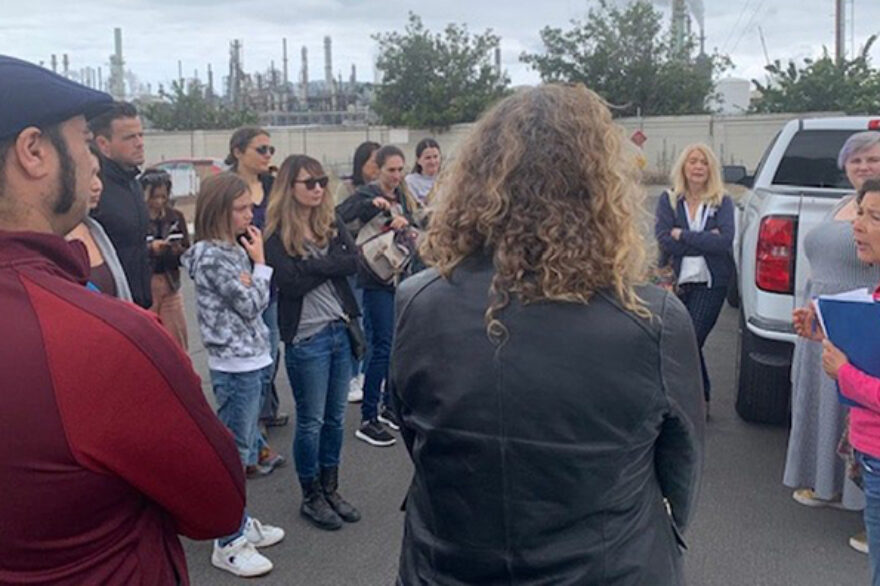Plastic Pollution Toxic Tour

It’s no secret that plastic is bad for the environment, but the inextricable relationship between plastic and fossil fuels is often overlooked: 99% of the world’s plastic is made from refined fossil fuels, and plastic harms the planet at every stage of its eternal life cycle, beginning with air pollution and carbon emissions from the oil refineries that create plastic and ending with waste polluting the oceans and littering the Earth.
Grim depictions of an Earth destroyed by climate change have appeared in popular culture for decades—from the trash mounds of WALL-E to the uninhabitable wasteland of Mad Max: Fury Road. But these dystopias are no longer speculative fiction. For many communities in Los Angeles, and across the globe, the climate apocalypse is already here. This June, Hollywood, Health & Society, in collaboration with Plastic Pollution Coalition, took a busload of television writers and showrunners on a “Toxic Tour” to explore first-hand the impact that pollution has on Los Angeles, and what the community is doing to solve it.
Over the course of a single day, the writers, community organizers and advocates, climate experts, and HH&S and Plastic Pollution Coalition staff traveled to the Inglewood and Wilmington oil fields, boarded Captain Charles Moore’s oceanic research vessel, dined on a delicious garden-to-table lunch, and took a private tour of new labs where groundbreaking research and is being conducted by the plastic pollution prevention organization Algalita.
One of the most impactful elements of the tour was hearing from experts on pollution, climate, and intersectional environmental justice. Driving South on La Cienega Boulevard, as the outside scenery changed from strip malls to clusters of oil rigs, Tianna Shaw-Wakeman shared the negative health impacts she’s seen in the Baldwin Hills community—notably, asthma and cancer in children and adults—as a result of close proximity to oil rigs and refineries. As the environmental justice program lead for Black Women for Wellness, Shaw-Wakeman works at the intersection of community-focused research, education, and advocacy.

Venezia Ramirez, a representative from Stand Against Neighborhood Drilling LA (STAND – L.A.), echoed Shaw-Wakeman’s concerns. A third-year environmental studies undergraduate at UCLA and research coordinator for USC’s Environmental Justice Research Lab, Ramirez is already making major environmental justice contributions on both the advocacy and research sides. She conducted research for the city of Maywood on remediating lead-contaminated soil. In 2020, she received an award from UCLA’s academic senate for her intersectional approach to environmental justice and climate research. Ramirez emphasized that legislative changes must be made to prohibit oil drilling and fossil fuel refinement in close proximity to residential areas. In partnership with Liberty Hill Foundation, Black Women for Wellness, and SCOPE, Ramirez and her organization’s tireless canvassing and advocacy contributed to Los Angeles County’s recent vote to phase out neighborhood oil drilling.
In the late morning, the tour met up with Alicia Rivera in Wilmington on a small street off Figueroa Place lined with brightly colored houses. Children’s toys littered front yards and dogs could be heard barking inside. The road ended abruptly with a chain-link fence abutting a concrete wall that is the only barrier between the residential cul-de-sac and the Phillips 66 oil refinery. Upon disembarking the bus, the headache-inducing odor of gas and the roar of machinery were immediately overwhelming. Rivera, a community organizer who has been working in Wilmington for over a decade, knows all the families living on the street personally and shared the disturbing statistic that every single family had been touched by cancer. Most of the plant’s employees, Rivera noted, do not live near the plant.
Later, aboard his oceanic research vessel Alguita, Capt. Charles Moore told the story of how accidentally stumbling upon the Great Pacific Garbage Patch in 1997 inspired him to center his research on understanding and monitoring marine plastic pollution. Beyond harming marine life, nanoplastics may pose a grave threat to the ocean’s ability to absorb carbon. The education non-profit Algalita works in tandem with Alguita’s research team to provide free materials and curricula to public schools to promote educating the next generation about the marine plastic crisis.
Yet the tour had its brighter moments. The group dined on a gourmet garden-to-table lunch provided by Moore’s abundant backyard produce, and vegan pizzas baked on-site by Long Beach caterer Primal Alchemy. The meal was as low-carbon emission as possible—everything was local and no plastic was involved. The day ended on an optimistic note, learning about Algalita’s educational impact and visiting the BYO shop adjacent to their new labs and offices. Tour participants received reusable hand soap containers to keep as a souvenir of the tour and physical reminder that disaster isn’t inevitable–our lifestyle choices can and do have an impact on our environment.
Hollywood, Health & Society is also now the proud owner of a small forest in Nepal. To offset the carbon cost of the bus tour, HH&S planted 125 trees via Tree Nation as part of a reforestation project in the South Asian country in the Himalayas. This effort offset 100,000 kg of CO2, which covers not just the carbon cost of the trip, but nearly the entire production of the bus itself.
The ultimate goal of the Toxic Tour was to demonstrate plastic’s intrinsic connection to pollution at every stage and dispel the myth that plastic and the carbon emissions crisis are unrelated. To witness up close the damage pollution inflicts on the local community was at times disheartening, but the Toxic Tour’s final takeaway was not an entirely pessimistic one. In just one day, several passionate experts shared how they’re using their unique skills, positionality, and interests to break the life-cycle of plastic pollution. The diversity of these experts’ knowledge, passions, and projects underscores that environmental justice can and should be integrated into every career field, and every aspect of daily life.
Further reading on the oil industry’s connection to Los Angeles: NPR: “Before Hollywood, the Oil Industry Made LA”
